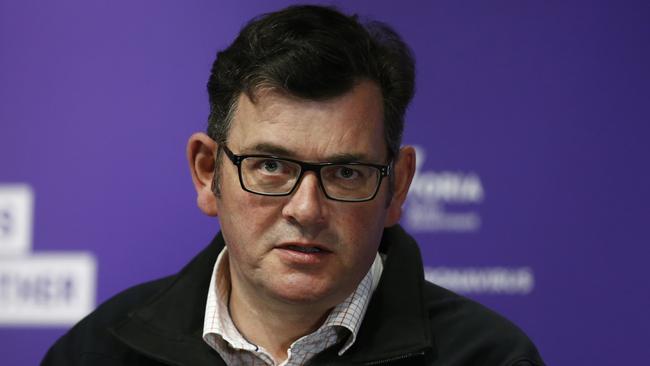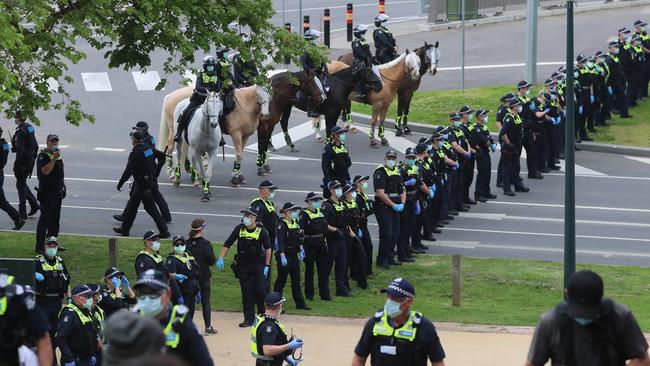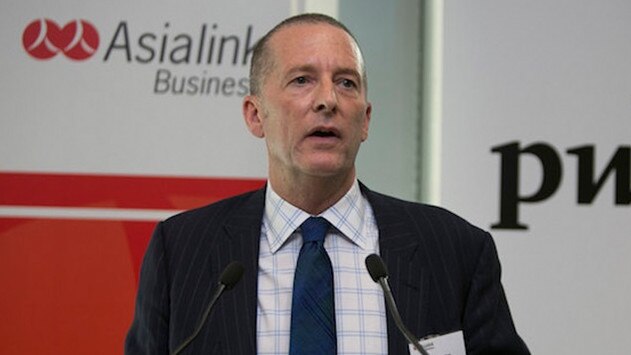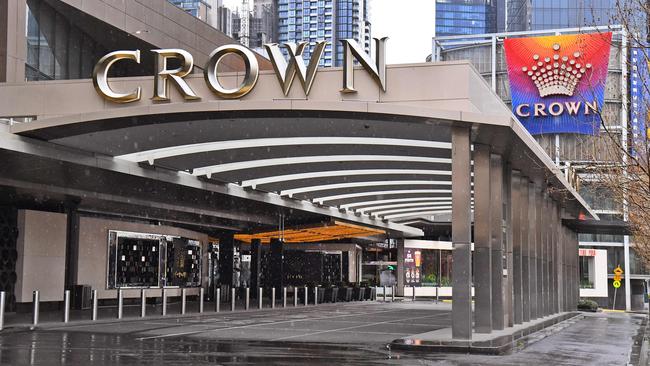State government annual reports reveal impacts of cost constraints and COVID
A new report has revealed how quickly contact tracers in the Victorian public health team were interviewing those who tested positive to COVID.

HS Coronavirus News
Don't miss out on the headlines from HS Coronavirus News. Followed categories will be added to My News.
The number of fat cats earning more than $300,000 each in key bureaucratic offices has soared, including in Daniel Andrews’s own department.
Annual reports tabled yesterday show that the Department of Premier and Cabinet had an extra 12 executives added to the payroll over the past year, while numbers also grew in the Department of Jobs.
And while the number of executives remained the same in the Department of Treasury and Finance, their wages blew out by 17 per cent in one year to $25.6 million — an average of $228,794 each.
In the premier’s department, 13 of 94 senior staff were paid more than $300,000, led by former secretary Chris Eccles, who pocketed more than $690,000.
Mr Eccles quit amid controversy over his evidence to the hotel quarantine inquiry.
Liberal MP Craig Ondarchie said the Department of Jobs, Precincts and Regions couldn’t meet business engagement targets as companies did it tough during COVID-19 in the past year.
There were 64 annual reports dumped by the government at state parliament on Thursday, with other revelations including:
— The Andrews Government agreed to cover blowout costs for the Melbourne Metro rail tunnel on June 30;
— A State government department gifted $5 million to Trades Hall just one year after handing over $7 million;
— Police hit violent offenders with more than 200 firearm prohibition orders;
DEPARTMENT OF HEALTH AND HUMAN SERVICES
The public health team in Victoria had just 57 staff before the pandemic hit.
Contact tracing staff were among the 57-strong workforce, which grew to 1891 staff by June as career epidemiologists and public health specialists were joined by drafted-in phone operators, logistics and data entry staff rostered on 24 hours a day.
The DHHS annual report also shows that by October 6 2020, 98.6 per cent of new COVID-19 cases were interviewed within a day of the department being notified of a positive test, with 99.7 per cent of all known contacts receiving messages about their status within 48 hours.
It also states that if a “business-as-usual approach” had been maintained 10,000 intensive care beds would have been needed and up to 9,200 Victorians would have been flooded the state’s hospitals each day.
VICTORIA POLICE
Public confidence in Victoria Police has dropped amid the pandemic.
The Victoria Police 2019-20 annual report shows 81.3 per cent of the community have confidence in the integrity of police.
The figure falls well below the force’s target figure of 87 per cent.
The drop in confidence follows months of public criticism toward the force for its response to the coronavirus pandemic, including claims of heavy-handed arrests and oppressive enforcement.
Police have also fallen short on meeting crime-solving targets.

Just over a third (38.1 per cent) of violence against crime offences were resolved within 30 days in the past financial year.
This is a 15.3 per cent fewer than the force’s target of solving 45 per cent of crimes within the 30-day period.
Victoria Police also failed to achieve its target of solving 25 per cent of property crimes within 30 days, reporting it had resolved only 20.8 per cent.
The report stated the targets were not met “due to increased crime rates and the diversion of Victoria Police resourcing tasked to manage coronavirus (COVID-19) compliance enforcement.”
FIREARMS
Police served more than 200 firearm prohibition orders in the past financial year to known violent offenders including members of outlawed motorcycle gangs and Middle Eastern crime gangs.
A total of 231 firearm prevention orders were issued in the 2019-2020 financial year, from 286 searches.
They recorded in excess of 80 offences against the Firearms Act 1996, 25 offences against the Control of Weapons Act 2006 and 131 offences against other Acts, identified as a result of the operation of the FPO scheme.
“We continued to commit a significant amount of resources to investigate and disrupt illicit markets in Victoria including for drugs and firearms,” the Victoria Police annual report said.
PROTESTS
Police were called to more than 100 CBD protests in Melbourne’s CBD during the first half of the 2019-2020 financial year, new data shows.
Almost 40 of these protests occurred in October 2019 when climate change was topical.
Victoria Police said they ensured public safety by “policing protests to minimise harm, disruption and risk to the community”.
WORKPLACE INCIDENTS
Workplace incidents for Victoria Police have increased 10 per cent year-on-year, attributable to the state’s horror summer bushfire season and the coronavirus pandemic.
The force recorded 3909 incidents in 2019-20, which included near-misses as well as those resulting in injury.
“The increase is largely attributable to the summer bushfires response as well as supporting Victoria’s coronavirus response,” the Victoria Police annual report said.
The state’s bushfire response recorded 55 incidents, 47 injuries and 9 WorkCover claims while the pandemic recorded 310 incidents, 193 injuries and 1 WorkCover claim.
103,205 shifts were lost as a result of WorkCover claims during the financial year.
BODY WORN CAMERAS
More than 1 million footage files were obtained by police in the 2019-20 financial year, after the successful rollout of more than 9000 body worn cameras.
The footage totalled in excess of 500GB in size.
A trial demonstrated collecting digital evidence reduced the trauma of victims in the justice system as they are only required to tell their story once.
“Due to the strength of the digital evidence, matters are finalised quicker, holding offenders to account and further reducing the trauma to affected persons,” the Victoria Police annual report said.

DEPARTMENT OF PREMIER AND CABINET
The state’s top paid bureaucrat former secretary of the DPC Chris Eccles was being paid up to $699,999 a year before he resigned over misleading evidence given to the hotel Quarantine inquiry.
DEPARTMENT OF TREASURY AND FINANCE
The wages bill for the bosses of Victoria’s Department of Treasury and Finance surged by a massive 17 per cent last year.
The department’s 112 executives – the same number as the previous year – were paid a total of $25.6m, an average of $228,794 each.
That was up from $21.8m the year before.
The department’s six top bureaucrats were paid a combined $3.5m, up from $3.1m.
It came as the department’s overall wages bill soared from $154m to $176m in just one year.
The report also revealed the department was now focused on developing a funding and financing strategy for the Suburban Rail Loop, a project tipped to cost at least $50bn.
HEALTHCARE
Even before the full force of the second coronavirus wave hit, Victoria’s hospitals had fallen more than 15 per cent behind on the number of elective surgery patients they had planned to treat, leaving more than an additional 30,000 languishing on waiting lists.
After managing to squeeze in an extra 632 procedures between March 15 and 25, Victoria’s public hospital operating theatres were directed to wind back all non-urgent elective surgery to brace for COVID-19 impacts.
As a result only 171,068 Victorians were treated from the state’s elective surgery waiting list – well down on the 203,020 who were supposed to have their operations.
Monash Health, The Royal Melbourne Hospital (RMH), Eastern Health and the Royal Children’s Hospital (RCH) all reported a drop in the number of elective surgeries performed in the year to June 30.
Eastern Health admitted 16,038 patients for such procedures, a drop of more than 11 per cent on the previous year, while about 30 per cent of those already on an elective surgery list were left waiting longer than recommended.
At RMH, that number was even higher with 41 per cent of those waiting for surgery doing so for longer than anticipated.
At Monash Health, more than 9000 patients were on a waitlist – well above the target of 7545.
Meanwhile the RCH, where some of the state’s sickest children are treated, reported 25 per cent of kids on waitlists and in need of elective surgery weren’t seen within their recommended time.
All of the above hospitals met their 100 per cent target for urgent category 1 elective surgeries.
The total treatments and services provided to admitted patients – known as separations – also fell 7.6 per cent lower than planned, with public hospitals undertaking 1,867,000 separations for patients rather than the anticipated 2,021,000.
Fears of a rise in delayed breast cancer diagnosis have been heightened by a sharp drop in women screened for the disease due to COVID-19.
Almost 49,000 women missed out on undergoing screening through BreastScreen Victoria after the service was suspended between March 25 and May 11, only to then re-open at a reduced capacity due to social distancing protections.
As a result the number of Victorian women screened for breast cancer dropped by 18.3 per cent, with only 218,129 women screened rather than the 267,000 forecast to require the service.
Hospital readmissions for patients suffering heart attacks after being discharged also jumped by an expected 40 per cent in the past year, highlighting concerns raised by cardiac specialists throughout the coronavirus pandemic.
The number of heart attack patients who had to be readmitted to hospital also increased from 1.5 to 2.1 per cent during 2019-20.
However, readmission and unplanned admission rates due to complications with most other conditions — including hip and knee replacements, and children’s tonsillectomy — remained stable.
INDEPENDENT BROAD-BASED ANTI-CORRUPTION COMMISSION
The integrity agency has revealed investigations are not being undertaken into some matters “even when the allegations in the complaint or notification met the criteria of being serious or systemic”, due to budget restraints.
During 2019/20 there were 24 probes and reviews of alleged serious public sector corruption and police misconduct.
VICTORIAN COMMISSION FOR GAMBLING AND LIQUOR REGULATION
Victoria’s gambling watchdog has still not completed its probe into the detention of Crown casino staff in China in 2016.
The investigation kicked off in the middle of 2017 but the Victorian Commission for Gambling and Liquor Regulation is still wading through a “voluminous” amount of “new material”.
In its annual report, tabled in state parliament on Thursday, the commission defended its slow progress tackling issues at Crown, also including allegations concerning money laundering and dodgy junket operators bringing high rollers to Melbourne from China.
The commission said it had launched a “comprehensive examination of issues” raised in a series of media reports last year, which had been a “complex process” that also relied on other inquiries and investigations into the casino.

It was only last year that the watchdog contacted former Crown staff based in China to see whether they would be interviewed — but the report did not say whether those interviews went ahead.
This year, Crown also waived its legal privilege over “a large amount of material” it had previously refused to provide, giving the commission more documents to work through.
The commission said it was “carefully monitoring” probes into Crown, including a bombshell public inquiry in NSW, to “inform any regulatory action which may be required”.
The report also revealed that Crown was yet to implement the commission’s recommendations to use new data analytics tools to identify patrons at risk of being harmed by gambling.
Crown bosses were due to meet the commission in March this year to discuss how they were implementing changes required after a review of Crown’s casino operator licence.
But that meeting was deferred because of the pandemic, and the commission said: “It is intended to hold a face-to-face meeting as soon as practicable.”
ROAD SAFETY CAMERA COMMISSIONER
Speed infringements fell more than 23 per cent during the pandemic due to less cars being on the road, but the data showed the empty roads led to more offenders being nabbed for excessive speeds.
“This seems to support reports across Australia that some people took advantage of lower traffic volumes to speed excessively”, the report said.
The commissioner is also recommending an audit of long term decommissioned cameras with too many staying offline for too long.
DEVELOPMENT VICTORIA
Development Victoria earned more than $181 million in land sales in the 12 months to June 30 this year, more than $138 million of it for “property development’’.
The windfall – for the sale of 47 plots of land – was $14.7 million less than during the same period the previous year.
Development Victoria’s annual report also reveals it offered $3.1 million worth of rent relief, in response to the coronavirus pandemic.
MORE NEWS
